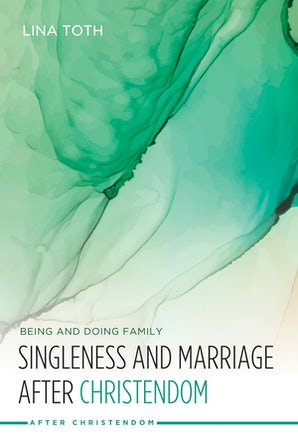Singleness, marriage, and church ministry today
Assistant Principal of the Scottish Baptist College Dr Lina Toth introduces her new book Singleness and Marriage after Christendom, which explores shifts in patterns of family and single living, and their significance for the church’s life and mission
 What do we make of the rising number of single people in our society and our churches? How did the shape of marriage and single living change in the course of Christianity’s story? How do we view contemporary challenges to marriage and singleness in light of the witness of the New Testament? What do happiness and a fulfilled life really mean for Jesus’ followers?
What do we make of the rising number of single people in our society and our churches? How did the shape of marriage and single living change in the course of Christianity’s story? How do we view contemporary challenges to marriage and singleness in light of the witness of the New Testament? What do happiness and a fulfilled life really mean for Jesus’ followers?
These are the questions I am exploring in Singleness and Marriage after Christendom. ‘After Christendom’ is an important descriptor: not only because this book is part of the After Christendom book series, but also because the rise of singlehood and the decline of marriage are viewed by some as a threat to the survival of both the church and Christianised civilisation.
In this book, I take a very different perspective, tracing various outlooks on singleness and marriage in light of Scripture, Christian tradition, and the history of Christendom. I observe how central marriage and having children were for the people of Israel, and how baffling the words of Jesus must have seemed to his contemporaries when he insisted on the husbands’ radical faithfulness to their wives, but also celebrated those who chose to forgo marriage for the sake of the Kingdom. His vision, seeped in the prophetic tradition, was of a new kind of a family.
For Jesus’ early followers, their Christian allegiance could well mean losing their previous identity and economic security, and joining an alternative support system—a new-order family called the church. After Christianity became the official religion of the empire, Christendom’s culture picked up the early Christian enthusiasm for celibacy, and elevated it to a state superior to marriage. But Christendom also encompassed lesser known forms of singlehood and alternative family arrangements—religious revival movements, confraternities, and guilds. To me, these were some of the most fascinating stories I got to explore during the course of writing this book.
During the Reformation period, the abuses of enforced celibacy became one of the focal points in the preaching of the Protestant reformers. Before too long, the newly Protestant lands were marked by a culture of suspicion towards those who were single without a “good” reason. In the wake of the Industrial Revolution, romance and emotional bonds became the primary goods of not only marriage, but also of what could be considered the best possible life. As countless romantic novels would tell us, one fell in love, and then created a family home to shelter them from the troubles of the world.
This is the storyline we have inherited, and under the power of which we still largely live. The contemporary wedding industry is an indication of how much power it still wields, even in the face of widespread cohabitation and divorce. What is also interesting is how this storyline gets expressed in the church context, in terms of the Christian ‘happiness package’. While it is acknowledged that God’s will may lead us to a path which does not involve marriage, romantic love and happy coupledom still function as the ultimate symbol and expression of God’s blessing.
As we watch Christendom melting away, I ask, how can our single lives and marriages, and our perceptions of a truly happy life, become more aligned with the teaching of Jesus? I look at several key areas of life, personal and communal, which may help us live into some answers. These include different ways, explicit and implicit, in which churches can convey their views on singleness and marriage. I also explore the importance of such practices as friendship, which should be more than just a personal relationship, but also a community-building and missional practice to which we are invited as friends of Jesus. Genuine communities of faith and belonging can make a world of a difference by providing a safe and transformative environment for making sense of our unresolved questions, bodily yearnings and the difficult, at times painful, twists and turns of our lives. In such an environment, all of us – married or single – can learn a much deeper and broader sense of fertility and creativity.
My view is that the demographic shift we are witnessing may well give Christian communities a precious gift. But these communities will need to do some serious work in re-imagining and re-learning happiness, so that they can help us make meaning out of the different and changing circumstances in which we may find ourselves. My hope is that some of the ideas I have shared in this book might be of help and inspiration to those who yearn for such creative meaning-making in their own lives—both as either single or coupled individuals, and as communities of God’s people.
Singleness and Marriage after Christendom: Being and Doing Family by Lina Toth is published by Wipf and Stock (2021).
Lina Toth is Assistant Principal and Lecturer in Practical Theology at the Scottish Baptist College, and Senior Research Fellow at the International Baptist Theological Study Centre, Amsterdam. She is also the author of Transforming the Struggles of Tamars: Single Women and Baptistic Communities (Wipf and Stock, 2014)
Lina led a Project webinar entitled "The minister and family life: a theological conversation" in February 2022. Access it here.
Do you have a view? Share your thoughts via our letters' page.
Baptist Times, 22/02/2022